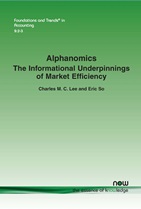Alphanomics: The Informational Underpinnings of Market Efficiency
Charles M. C. Lee, Stanford University, USA, clee8@stanford.edu , Eric C. So, Massachusetts Institute of Technology, USA, eso@mit.eduAbstract
This monograph is a compact introduction to empirical research on market efficiency, behavioral finance, and fundamental analysis. The first section reviews the evolution of academic thinking on market efficiency. Section 2 introduces the noise trader model as an alternative framework for market-related research. Section 3 surveys the growing literature on the causes and consequences of investor sentiment. Section 4 examines the role of fundamental analysis in value investing. Section 5 contains a survey of the literature on arbitrage costs and constraints, and Section 6 discusses research methodology issues associated with the need to distinguish between mispricing from risk.
Alphanomics: The Informational Underpinnings of Market Efficiency
Alphanomics: The Informational Underpinnings of Market Efficiency is intended to be a compact introduction to academic research on market efficiency, behavioral finance, and fundamental analysis and is dedicated to the kind of decision-driven and prospectively-focused research that is much needed in a market constantly seeking to become more efficient. The authors refer to this type of research as Alphanomics, the informational economics behind market efficiency. Alpha refers to the abnormal returns, which provide the incentive for some subpopulation of investors to engage in information acquisition and costly arbitrage activities. Nomics refers to the economics of alpha extraction, which encompasses the costs and incentives of informational arbitrage as a sustainable business proposition.
Some of the questions that are addressed include: why do we believe markets are efficient?; what problems have this belief engendered?; what factors can impede and/or facilitate market efficiency?; what roles do investor sentiment and costly arbitrage play in determining an equilibrium level of informational efficiency?; what is the essence of value investing?; how is it related to fundamental analysis (the study of historical financial data)?; and how might we distinguish between risk and mispricing based explanations for predictability patterns in returns?
The first two sections review the evolution of academic thinking on market efficiency and introduce the noise trader model as a rational alternative. Section 3 surveys the literature on investor sentiment and its role as a source of both risks and returns. Section 4 discusses the role of fundamental analysis in value investing. Section 5 reviews the literature on limits to arbitrage, and section 6 discusses research methodology issues associated with the need to distinguish mispricing from risk.
Praise for Alphanomics:
"Alphanomics provides an excellent framework of the theoretical underpinnings of market efficiency and fundamental analysis, combined with a thorough discussion of a vast empirical literature devoted to these topics.Alphanomics is a great reference material for anyone seeking a deep understanding of how equity prices incorporate information and the implications for equity valuation"
-- Scott Richardson, London Business School
